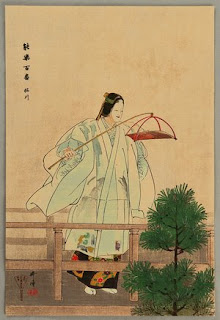The
Japanese dramatist Zeami is credited with originating the bulk of the
repertoire of Noh plays, among them a short piece about love and madness called Sakuragawa.
Sakuragawa
is the name of a river famous for its cherry trees. In the play, the heroine
scoops up petals of cherry blossoms out of the river, mourning the
disappearance of her beloved son, whose name Sakurago associates him with
cherry blossoms.
The
first scene of the play shows a human trafficker explaining to the mother that her son has sold himself to escape poverty. The mother is driven mad, and the
highlight of the play is her performing an elaborate dance of madness while
accompanied by a flute and drums.
Because
her madness renders her so eccentric, people from all around come to watch the
woman attempt to scoop cherry petals from the water, even as more and more
fall. After years pass, Sakurago comes to the river and sees her there. The
woman does not recognize her son immediately, but eventually she understands
that it is him, and the two have a touching reunion.
The piece is simple and relatively straightforward, but its depiction of motherly devotion and filial piety has made it popular for hundreds of years.
